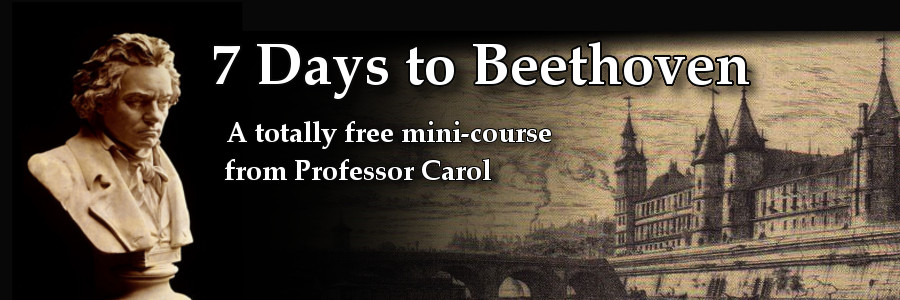What makes Beethoven so special?
What Makes Beethoven So Special?
With this free mini-course, you will . . .
|
|
|
Get the course FREE delivered to your email one unit per day.
No obligation. Just enter your email to receive a new lesson each day for the next seven days. Each lesson links to a great performance of Beethoven’s music.
Circle of Scholars members may access the course here.
Enjoy Professor Carol’s unique insights!
If you want to know what makes Beethoven so special, the answers are right here. Here’s what course participants say:
- ‘7 Days to Beethoven’ was the perfect survey of his life and work! Bite-size, but full of depth, the mini-course opened up the world of Beethoven!
- Above and beyond. I really enjoyed the links to the music performances
- I was actually expecting less; it exceeded my expectations.
- I hoped to learn more about Beethoven through this course and I absolutely did
- I didn’t think it would be this entertaining.
PREVIEW: 7 Days to Beethoven
A person could spend a lifetime studying Beethoven’s music and getting to know his life and times. In this 7-day series, though, we’ll introduce the basics and open doors to help you discover and enjoy his music even more.
Taken together, they answer the question: What makes Beethoven so special?
 Beethoven would be surprised at the extent of his fame. He lived at a time when the Age of Enlightenment, characterized by the music of Mozart and Haydn, was coming to an end. The French Revolution and the rise of Napoleon caused drastic changes in Europe. As traditional institutions in Europe crumbled, an age without the old social structures became an “Age of Individualism”—an age in search of heroes.
Beethoven would be surprised at the extent of his fame. He lived at a time when the Age of Enlightenment, characterized by the music of Mozart and Haydn, was coming to an end. The French Revolution and the rise of Napoleon caused drastic changes in Europe. As traditional institutions in Europe crumbled, an age without the old social structures became an “Age of Individualism”—an age in search of heroes.
 After Napoleon’s defeat, the 19th century became the “Age of Individualism.” Artistic genius began to be regarded as something highly admirable and extraordinary, almost supernatural. It was perhaps inevitable that one individual would become the personification of artistic genius, and that person was Beethoven.
After Napoleon’s defeat, the 19th century became the “Age of Individualism.” Artistic genius began to be regarded as something highly admirable and extraordinary, almost supernatural. It was perhaps inevitable that one individual would become the personification of artistic genius, and that person was Beethoven.
 Romanticism began primarily as a literary movement. It can be seen as a reaction to the Enlightenment’s conviction that the world was an orderly place in which rational knowledge could provide solutions to all human problems. The devastation of the French Revolution and the Napoleonic Wars convinced people that rationality had its limits, that the world was in fact disorderly and unpredictable.
Romanticism began primarily as a literary movement. It can be seen as a reaction to the Enlightenment’s conviction that the world was an orderly place in which rational knowledge could provide solutions to all human problems. The devastation of the French Revolution and the Napoleonic Wars convinced people that rationality had its limits, that the world was in fact disorderly and unpredictable.
 Beethoven was a wordsmith. He dealt in what we call musical rhetoric. Instead of sweeping melodies, we find short melodic gestures. Take for example the opening of his Fifth Symphony, what may be the most famous four notes of music ever. It’s not a melody; it’s an exclamation! Here we find something that really is a distinguishing feature of Beethoven’s music.
Beethoven was a wordsmith. He dealt in what we call musical rhetoric. Instead of sweeping melodies, we find short melodic gestures. Take for example the opening of his Fifth Symphony, what may be the most famous four notes of music ever. It’s not a melody; it’s an exclamation! Here we find something that really is a distinguishing feature of Beethoven’s music.
 Beethoven was shaking up musical form! The more discerning of Beethoven’s supporters enjoyed his radical experiments with form. But he lost a lot of patrons who might have paid him to write new works. And he created a reputation that his music was difficult and hard to follow. Even the players had trouble with the unexpected turns in Beethoven’s compositions.
Beethoven was shaking up musical form! The more discerning of Beethoven’s supporters enjoyed his radical experiments with form. But he lost a lot of patrons who might have paid him to write new works. And he created a reputation that his music was difficult and hard to follow. Even the players had trouble with the unexpected turns in Beethoven’s compositions.
 What effect did his deafness have? Not what people usually think. Cut off from normal interactions as a working musician, Beethoven drew deeply into his creative inner world. He might not have stretched musical form, harmony, or melody quite so far if he’d had to make the ordinary daily compromises his profession required. But he let his ideas explode onto paper. And from those ideas, a new musical sound arose.
What effect did his deafness have? Not what people usually think. Cut off from normal interactions as a working musician, Beethoven drew deeply into his creative inner world. He might not have stretched musical form, harmony, or melody quite so far if he’d had to make the ordinary daily compromises his profession required. But he let his ideas explode onto paper. And from those ideas, a new musical sound arose.
 He fit the protoype of the individual hero. And the massive scope of his music, as well as its intensity, made him a perfect bearer of the label of Monumentalism. Throughout the 19th-century, so much did become bigger, more intense, more massive, more monumental in its impact. With hindsight we can say that composers after Beethoven took from him a kind of automatic permission to push things to the limit.
He fit the protoype of the individual hero. And the massive scope of his music, as well as its intensity, made him a perfect bearer of the label of Monumentalism. Throughout the 19th-century, so much did become bigger, more intense, more massive, more monumental in its impact. With hindsight we can say that composers after Beethoven took from him a kind of automatic permission to push things to the limit.

